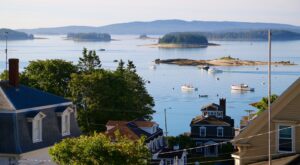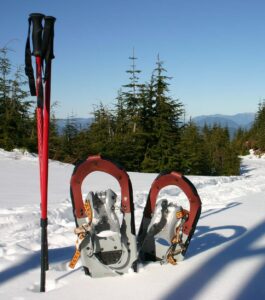‘We’re all in this together’: Students lead climate-planning project
A team of graduate students steps into collaborative leadership to help tourism-dependent communities in Maine plan for climate change.
December 2020
Graduate students at the University of Maine often participate in research, whether their field is economics, ecology or anthropology. Rather than just participating in research, however, a team of graduate students—Valeria Briones, Asha DiMatteo-LePape, Lydia Horne, and Gabriela Wolf-Gonzalez—is leading an innovative new project.
The focus of their project, We’re All in This Together: Participatory Planning for Climate Change Adaptation, is to help Maine communities that rely on natural resources—specifically outdoor recreation and tourism—develop their capacity to plan and prepare for climate change. In 2019, tourism in Maine supported more than 116,000 jobs (about 17% of total employment), with about $9.7 billion in economic contributions, according to a recent report from the Maine Office of Tourism.
 Climate change presents both challenges and opportunities for tourism-dependent communities, which may not have access to data and other resources needed to adapt to a shifting climate. Through this project, the research team will help connect communities with climate data specific to their local area. They will also collaborate with community stakeholders to develop a framework for climate adaptation, using ‘scenario planning’—a method of forecasting potential future conditions that can inform decision-making. The approaches developed in this project could be useful in other communities that depend on natural resources, such as those involved in agriculture, forestry or fishing.
Climate change presents both challenges and opportunities for tourism-dependent communities, which may not have access to data and other resources needed to adapt to a shifting climate. Through this project, the research team will help connect communities with climate data specific to their local area. They will also collaborate with community stakeholders to develop a framework for climate adaptation, using ‘scenario planning’—a method of forecasting potential future conditions that can inform decision-making. The approaches developed in this project could be useful in other communities that depend on natural resources, such as those involved in agriculture, forestry or fishing.
Research and practice
The students are part of the first cohort of seven participants in the National Science Foundation’s Research Traineeship Program (NRT) in Conservation Science and Practice at UMaine. The program began in fall 2018 and is funded by a five-year, $2.9 million grant. Sandra De Urioste-Stone, leader of the NRT program in conservation science, associate professor of nature-based tourism, and a Mitchell Center faculty fellow, advises the students in collaboration with other UMaine faculty.
They come from diverse backgrounds and academic fields and each student has her own research focus. Their interests range from shifts in seasonal forest cycles, to moose conservation and management, to how Maine coastal communities perceive climate change and its impacts, all feeding into their collaborative efforts on this project.
One of their early class assignments was to develop a group research and funding proposal related to their NRT work, and search for grant opportunities. Their climate-planning project “started off as a class assignment and grew from there,” says Gabriela. The project goes well beyond their NRT and class requirements “because we went for it!” Lydia adds.
Setting out
 The team initially brainstormed about their areas of interest and backgrounds to see where there was common ground. They found overlap around the theme of ‘shifting seasons,’ looking at climate change in relation to both nature and human communities. After taking a communication facilitation course, they decided to develop a series of participatory workshops as the core of their project. These workshops will be a vehicle for learning what climate challenges and opportunities a community may face, what resources they have, and what potential solutions could be. For example, in a community that relies on winter outdoor recreation, one solution might be to find ways to diversify and incorporate more year-round activities, such as promoting the resources of a ski area for hiking and biking trails in the warmer months. “We want to make sure the research is actually useful,” Lydia says.
The team initially brainstormed about their areas of interest and backgrounds to see where there was common ground. They found overlap around the theme of ‘shifting seasons,’ looking at climate change in relation to both nature and human communities. After taking a communication facilitation course, they decided to develop a series of participatory workshops as the core of their project. These workshops will be a vehicle for learning what climate challenges and opportunities a community may face, what resources they have, and what potential solutions could be. For example, in a community that relies on winter outdoor recreation, one solution might be to find ways to diversify and incorporate more year-round activities, such as promoting the resources of a ski area for hiking and biking trails in the warmer months. “We want to make sure the research is actually useful,” Lydia says.
The team has begun working with Acadia National Park and other stakeholders on Mount Desert Island (MDI) in Downeast Maine to identify and connect with communities that could find value in the project. The Downeast region relies heavily on tourism and outdoor recreation, from hiking and biking to cross-country skiing and kayaking.
Stepping into leadership, together
Collaboration among the students is also an important aspect of the project, with shared decision-making a key component. “Everyone has the opportunity to lead,” says Lydia.
The students came to the project with varied levels of experience in developing a research initiative, securing funding—and in leadership. They all note that leading a project collaboratively is a new experience, and that this project is larger in scale and complexity than others they have pursued.
Valeria notes that they’ve been “transparent and honest with what we could realistically take on” and they check in with each other regularly along the way. Asha adds, “I think that the process of us designing this together, instead of one person coming in with a project or an idea they felt really strongly about, has helped a lot.”
Training the next generation of conservation leaders and helping students gain real-world experience are focuses shared by the NRT and the Mitchell Center.
“We’re pretty lucky at UMaine to have a place like the Mitchell Center that is very applied and solutions-oriented,” Lydia notes. “There is this narrative that academics live in the proverbial ‘ivory tower’ and their research is purely for scientific inquiry. Our project hopes to achieve the opposite effect, where our participatory workshop framework is co-developed with community partners to directly help communities plan for environmental change.”
